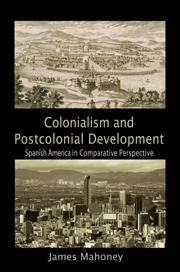Book contents
- Frontmatter
- Contents
- List of Tables, Figures, and Maps
- Preface
- 1 Explaining Levels of Colonialism and Postcolonial Development
- 2 Spain and Its Colonial Empire in the Americas
- 3 Mercantilist Colonialism
- 4 Liberal Colonialism
- 5 Warfare and Postcolonial Development
- 6 Postcolonial Levels of Development
- 7 British and Portuguese Colonialism
- 8 Conclusion
- Notes
- Glossary
- Select Bibliography of Works on Colonial Spanish America
- Index
- Titles in the Series
Preface
Published online by Cambridge University Press: 05 June 2012
- Frontmatter
- Contents
- List of Tables, Figures, and Maps
- Preface
- 1 Explaining Levels of Colonialism and Postcolonial Development
- 2 Spain and Its Colonial Empire in the Americas
- 3 Mercantilist Colonialism
- 4 Liberal Colonialism
- 5 Warfare and Postcolonial Development
- 6 Postcolonial Levels of Development
- 7 British and Portuguese Colonialism
- 8 Conclusion
- Notes
- Glossary
- Select Bibliography of Works on Colonial Spanish America
- Index
- Titles in the Series
Summary
Comparative-historical analysis achieves its potential when it generates new theoretical insights of broad utility and novel understandings of particular cases. Focused on questions of colonialism and postcolonial development, this book seeks to realize the dual promise of comparative-historical analysis. It offers a general theory for explaining variations in colonialism and long-run development among non-European countries. And it uses this theory, along with other analytical principles, to work out a new explanation of colonial and postcolonial experiences specifically for fifteen mainland countries of Spanish America.
The book's argument takes issue with certain assumptions embedded in leading geographical and institutional explanations of development, offering alternative and more historically oriented frames of reference in their place. It insists that to explain forms of colonialism, one must look at the interaction between the potentially evolving political-economic institutions of the colonizing nation and the societal institutions in the colonized territory, which also may change over time. And to make sense of the consequences of colonialism for development, the book argues, one must pay special attention to the collective actors that are born out of colonialism and whose capacities will vary depending on the kinds and extent of colonial institutions that were implanted. When applied to Spanish America, the approach yields a new account of why certain territories were subjected to more or less colonialism across different eras and why these alternative colonial experiences gave rise to new nations with contrasting levels of economic and social development.
Information
- Type
- Chapter
- Information
- Colonialism and Postcolonial DevelopmentSpanish America in Comparative Perspective, pp. xiii - xviiiPublisher: Cambridge University PressPrint publication year: 2010
